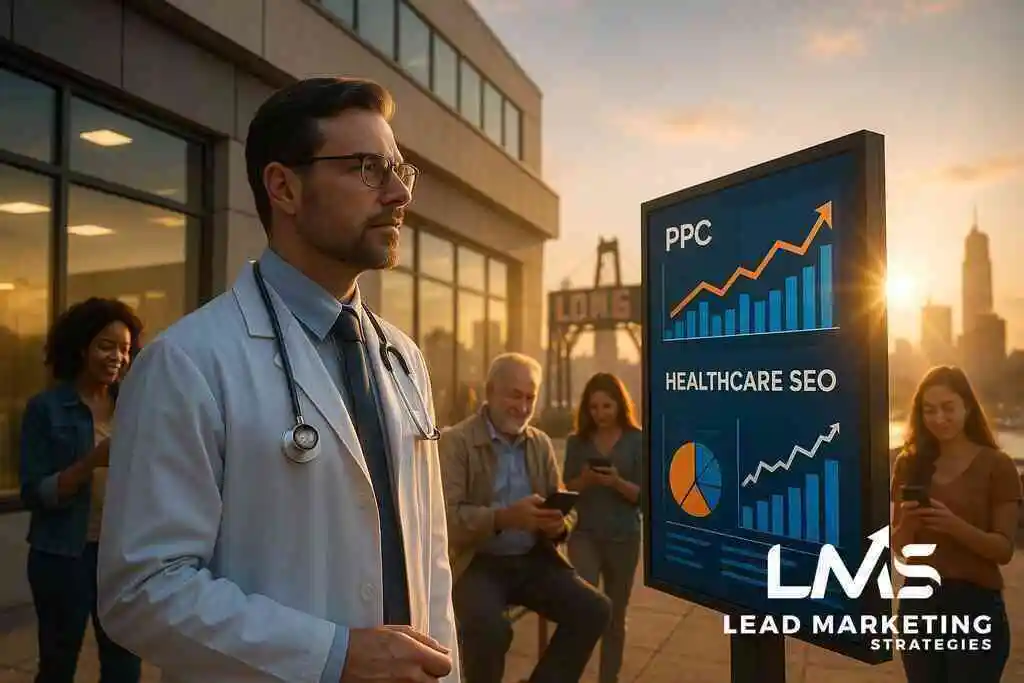
Navigating the Complex World of PPC Advertising
Defining the Landscape: What Advanced PPC Means Today
In today’s digital marketing ecosystem, advanced PPC strategies have emerged as crucial elements for businesses aiming to thrive online. These strategies encompass a wide array of sophisticated techniques, such as audience segmentation, keyword targeting, and AI-driven bidding mechanisms. Mastering these tactics can lead to noteworthy improvements in ad spend efficiency and conversion rates. As algorithms and consumer behaviors continue to evolve, businesses must stay ahead by adopting the latest techniques. By leveraging advanced PPC strategies, marketers can craft highly targeted advertising campaigns that maximize reach and impact in an ever-competitive landscape.
Marketing Tip’s Role in Transforming PPC Campaigns
Marketing Tip, powered by Lead Marketing Strategies, plays a pivotal role in redefining how businesses approach PPC campaigns. By offering actionable insights and expert guidance, Marketing Tip helps organizations implement cutting-edge techniques that push the envelope on campaign performance. The blog serves as a rich resource, empowering businesses with the tools they need to optimize their pay-per-click management efforts. With a focus on data-driven strategies, Marketing Tip guides companies toward achieving superior results, ensuring they remain competitive. As the digital landscape shifts, Marketing Tip continues to be an invaluable partner for those striving to excel in PPC advertising.
The Significance of PPC in Digital Marketing Strategies
PPC advertising remains a cornerstone of effective digital marketing strategies, underscoring its significance in the broader marketing mix. Through precise targeting and measurable outcomes, PPC enables businesses to reach potential customers effectively while controlling budgets. According to the latest digital marketing significance assessments, PPC offers unparalleled insights into customer behavior and preferences. Its ability to generate immediate visibility on search engines elevates brand awareness and drives direct traffic. As a result, understanding and implementing effective PPC tactics is imperative for any company looking to solidify its presence and drive engagement in the digital marketplace.
Unveiling Advanced Targeting and Optimization Strategies
The Power of Audience Segmentation for PPC Success
At the heart of modern PPC management lies the fundamental concept of audience segmentation. By dividing a broad target audience into smaller, more specific groups, businesses can craft highly personalized campaigns. This approach not only enhances relevance but also boosts engagement rates significantly. Advertising insights at Marketing Tip emphasize the importance of using demographic data, browsing habits, and purchase histories to refine audience segments. This level of precision targeting transforms the effectiveness of pay-per-click models, yielding higher ROI and conversion rates. By continuously analyzing and adjusting these segments, marketers ensure they reach the right people with the right message at the right time.
Creative Keyword Targeting Techniques for Maximum Impact
To dominate the digital advertising arena, mastering keyword targeting is essential. Leveraging innovative techniques can provide a competitive edge, especially in saturated markets like New York. Effective strategies involve a mix of broad, phrase, and exact match keywords tailored to real-time search inquiries. By using PPC keyword targeting in New York, businesses can increase visibility among their most valuable prospects. Incorporating negative keywords also helps in filtering out irrelevant traffic, thereby improving ad spend efficiency. Continuous keyword optimization ensures that campaigns remain aligned with evolving user search behavior, ultimately enhancing visibility and engagement.
Harnessing Geo-Targeting in PPC Campaigns
Geo-targeting has revolutionized the capability of PPC campaigns to target audiences based on specific locations. By using location-specific data, brands can reach potential customers in targeted regions, optimizing resource allocation and enhancing localization efforts. PPC geo-targeting strategies enable marketers to tailor messages that resonate with local cultures and preferences. This level of customization increases the ad’s appeal and relevance, driving higher engagement rates. For businesses operating in diverse markets, geo-targeting is indispensable, bridging the gap between local consumer desires and brand offerings, thus elevating conversions and brand loyalty.
Ad Copywriting Techniques that Enhance Click-Through Rates
Compelling ad copy is fundamental to capturing attention and enticing clicks in PPC advertising. Crafting messages that resonate emotionally or offer valuable solutions can significantly improve click-through rates. Techniques such as emphasizing unique selling propositions, incorporating strong calls to action, and using emotional triggers are vital. Ad copywriting for better CTR not only involves creativity but also an understanding of the target demographic’s motivation and behavior. Continuous testing and refinement of ad elements ensure that the messaging remains compelling and aligned with audience preferences. This dynamic approach to ad copywriting underpins the success of PPC campaigns in realizing impactful results.
Mastering the Art of Efficiency and Analysis
Achieving Ad Spend Efficiency through Data-Driven Insights
In the world of pay-per-click management, achieving ad spend efficiency is paramount. By harnessing data-driven insights, marketers can optimize ad spends to ensure maximum return on investment. Advanced data analytics uncover trends and patterns in consumer behavior, enabling businesses to allocate their budgets more effectively. Techniques such as real-time bidding adjustments and predictive modeling play a crucial role in cost management. By meticulously analyzing metrics and continually refining approaches, businesses can enhance their ad spend efficiency and ensure they are investing in strategies that drive measurable results.
Competitor Analysis: Outsmarting Rivals Through PPC
Competitor analysis is a vital strategy for outsmarting rivals in the PPC landscape. Understanding the methods competitors employ provides businesses with the opportunity to refine their own campaigns. Tools and techniques like competitor PPC analysis offer insights into rivals’ keyword strategies, bidding patterns, and ad copies. By examining competitor strengths and weaknesses, businesses can strategically position themselves to capture market share. This proactive approach not only levels the playing field but also fosters innovation and creativity in campaign creation.
Optimizing Landing Pages for Conversion Rate Uplift
The process of PPC landing page optimization is critical to elevating conversion rates. A well-designed landing page can significantly influence a user’s decision to engage or convert. Key elements such as compelling headlines, eye-catching visuals, and clear calls to action must be meticulously crafted. Moreover, landing pages should be relevant to the search query and consistent with ad messaging to reduce bounce rates. Focusing on user experience through mobile responsiveness and fast loading times enhances the likelihood of conversion. Continuous testing and refinement are essential to maintaining a high-performing landing environment.
Cost-Per-Click Reduction Techniques That Work
Reducing the cost-per-click (CPC) while maintaining effectiveness is a common goal in PPC management. Techniques such as improving quality scores through high relevance and targeting can lead to lowered CPCs. Leveraging long-tail keywords and advertising insights at Marketing Tip also assist in identifying less competitive and more cost-effective avenues. Implementing negative keywords ensures that the budget is not wasted on irrelevant clicks. By continuously assessing and tweaking campaign components, businesses can achieve cost efficiency in PPC while driving impactful results.
Innovative Approaches to PPC Management
Exploring Automated Bidding and AI in PPC Advertising
Venturing into automated bidding and incorporating AI in PPC advertising can significantly boost campaign performance and efficiency. These sophisticated technologies allow marketers to adjust bids in real-time based on a user’s behavior, time of day, and other predictive metrics. By doing so, businesses can optimize their ad spend and focus on conversions that matter most. The integration of AI and automated bidding in PPC ensures that campaigns are continually refined for efficiency and effectiveness, shifting resources where they yield the best results. This smart approach not only saves time but also improves overall ad performance by targeting high-value leads with precision.
Harnessing the Potential of Dynamic Search Ads
Dynamic search ads represent a paradigm shift in how businesses approach PPC advertising, offering a highly adaptable and responsive advertising format. This approach leverages website content to dynamically generate ads that align seamlessly with customer search queries. By doing so, businesses eliminate the need for detailed keyword lists, instead focusing on relevant ad generation that resonates with user intent. Dynamic search allows for broader audience capture while maintaining ad targeted relevance. This method contributes to cost efficiency in PPC campaigns, ensuring that businesses can maintain a high standard of advertising engagement without the painstaking process of manual ad creation. The adaptability of dynamic search ads positions them as a vital component in modern PPC strategy.
The Future of Remarketing Strategies in PPC
Remarketing stands poised to revolutionize how businesses reconnect with potential customers who previously interacted with their brand. With advancements in data analytics and AI, remarketing offers tailored ads that re-engage users by showcasing relevant products or services they have expressed interest in before. This strategic retargeting generates higher conversion rates by keeping the brand top-of-mind. The future of PPC remarketing focuses on deeper personalization and timing precision, ensuring ads are seen when users are most likely to engage. This heightened level of individualized experience paves the way for enhanced customer relationships, brand loyalty, and ultimately, sales growth.
Scaling Your PPC Campaigns for Greater Reach and Impact
Scaling PPC campaigns effectively requires a balance between expanded reach and maintaining effectiveness. To achieve this, marketers must leverage multichannel strategies that encompass search engines, social media, and display networks, providing a comprehensive audience reach. Utilizing tools and insights such as data-driven decisions and audience analytics, businesses can expand without compromising on the quality of leads generated. Dynamic search and predictive analytics support scaling efforts by optimizing targeting criteria and budget allocation. Emphasizing PPC campaign scalability ensures that campaigns grow sustainably, driving increased brand visibility and engagement across a broader spectrum of potential customers. This strategic growth model supports both immediate advertising needs and long-term brand development.
Crafting a Roadmap for Continued Success
A/B Testing: Driving Measurable Results and Improvements
A/B testing plays a pivotal role in enhancing the effectiveness of PPC campaigns by providing valuable insights into what resonates with the target audience. By testing different ad elements such as headlines, images, and calls to action, businesses can determine which versions yield the highest engagement rates and conversions. Implementing A/B testing for PPC improvement can thus drive measurable results and streamline the path toward campaign success. The continuous cycle of testing and optimization ensures that PPC strategies remain aligned with evolving consumer preferences, thereby enhancing overall performance. Ultimately, this data-driven approach empowers marketers to make well-informed decisions that improve ad spend efficiency and potentiate higher returns.
Using PPC Performance Metrics to Inform Strategy
Analyzing PPC performance metrics is crucial for informing strategic decisions and optimizing campaigns for success. Key performance indicators such as click-through rates, conversion rates, and cost-per-acquisition provide insights into how effectively ads are performing. By leveraging PPC metrics for strategy, businesses can identify trends and make data-backed decisions that enhance campaign efficiency. Monitoring these metrics allows marketers to quickly react to changes in consumer behavior and adjust their strategies accordingly. This continuous assessment not only aids in maintaining optimal performance but also ensures resources are allocated to the most impactful campaigns. Implementing strategies based on robust metric analyses ensures longevity and competitiveness in the digital advertising arena.
The Role of PPC Campaigns in Building Brand Awareness
PPC campaigns are instrumental in building brand awareness by increasing visibility and engagement across digital platforms. By appearing prominently in search engine results and social media, businesses can reach a wider audience and cultivate recognition. Effective use of PPC allows for the creation of impactful branding moments that resonate with potential customers, instilling familiarity and trust. Incorporating branding in PPC campaigns fosters a stronger brand presence, which is crucial for standing out in a competitive market. Through precise targeting and strategic ad placement, companies can ensure that their brand message reaches the right audience, thus reinforcing market positioning and driving long-term success. This approach not only enhances immediate visibility but also paves the way for lasting brand loyalty.
Marketing Tip’s Guide to Future Trends in PPC Advertising
Staying ahead of the curve in PPC advertising requires anticipating future trends and adopting innovative solutions. Marketing Tip offers expert insights and analysis on forthcoming advancements that promise to reshape the digital advertising landscape. By understanding and implementing PPC trend predictions by Marketing Tip, businesses can tailor their strategies to capitalize on emerging opportunities. The integration of AI, the growing importance of mobile-first advertising, and the focus on personalized ad experiences are some predicted trends that could redefine PPC campaigns. Aligning with these trends not only enhances current campaigns but also ensures readiness for future shifts. This forward-thinking approach positions businesses to gain a competitive edge and sustain growth within the dynamic world of PPC advertising.
The Culmination of Advanced PPC Insights
Synthesizing Strategies for Holistic PPC Success
In a swiftly evolving digital landscape, synthesizing various elements of pay-per-click optimization into a cohesive strategy marks the cornerstone of success. By integrating diverse advanced PPC strategies, businesses can foster a robust and adaptable advertising framework that maximizes results. Key components like audience segmentation, creative keyword targeting, and automated bidding systems contribute collaboratively to achieving holistic success in PPC campaigns. Marketers should strive for a unified approach, leveraging insights from competitive analysis and data-driven decision-making to craft impactful campaigns. By continually merging the latest tactics with foundational advertising principles, businesses position themselves to harness the full potential of their PPC efforts.
Ensuring Long-Term Success with Marketing Tip’s Expertise
At the forefront of pioneering digital marketing solutions, Marketing Tip provides the expertise and guidance necessary for attaining sustained excellence in PPC campaigns. Through an expansive repository of knowledge, businesses can learn to execute campaigns with precision and agility. Marketing Tip’s resources equip advertisers with the tools to enhance conversion rates and brand visibility, ensuring a significant return on investment. By fostering a culture of continuous learning and adaptation, organizations can stay ahead of industry trends and remain competitive. Engaging with Marketing Tip’s insights empowers marketers to refine their strategies and optimize outcomes, setting a standard for sustained digital advertising excellence.
Embracing Change: The Evolving Landscape of PPC Advertising
The domain of PPC advertising is in a constant state of transformation, urging marketers to be proactive in embracing change. As platforms advance and user behaviors shift, it becomes crucial to adopt innovative strategies swiftly. Staying attuned to the dynamics of automation, AI integration and emerging ad formats is vital for maintaining a competitive edge. By recognizing the inherent adaptability required in PPC advertising dynamics, businesses can effectively navigate transitions and capitalize on new opportunities. Embracing these changes not only enhances campaign performance but also propels brands toward achieving heightened visibility and consumer engagement. Companies ready to evolve with the landscape position themselves as leaders in a digital advertising world marked by constant innovation.
Frequently Asked Questions
Question: How does audience segmentation enhance the effectiveness of PPC campaigns?
Answer: Audience segmentation lies at the heart of successful PPC management strategies. By dividing a broad audience into smaller, more distinct groups, marketers can craft personalized campaigns that resonate better with each segment. This approach enhances the relevance of ads, boosts engagement rates, and ultimately leads to higher conversion rate enhancement. By utilizing advanced PPC tactics like audience segmentation, businesses can ensure their ads are compelling and timely, significantly improving overall ad spend efficiency.
Question: What role does competitor analysis play in refining PPC strategies?
Answer: Competitor analysis in PPC is crucial for gaining an edge in the digital marketplace. By understanding your rivals’ keyword strategies, ad copies, and bidding patterns, you can adjust your campaigns to better target your desired audience while avoiding common pitfalls. This analysis helps devise effective ad bidding strategies and identify opportunities for cost-per-click reduction. By strategically applying insights gained from competitor analysis, businesses can enhance their PPC management strategies and improve visibility and impact.
Question: Can you explain the benefits of using automated bidding and AI in PPC campaigns, as discussed in ‘Understanding Advanced PPC Tactics at Marketing Tip’?
Answer: Automated bidding and the integration of AI into PPC advertising are revolutionizing the way campaigns are managed. These technologies allow for real-time adjustments to bids based on user behavior and other predictive metrics, thereby optimizing conversions and ad spend efficiency. As detailed in Understanding Advanced PPC Tactics at Marketing Tip, this approach not only saves time but also enhances the precision of targeting high-value leads. Leveraging AI in PPC ensures that campaigns are continuously refined for optimal performance, making it an indispensable tool in modern digital marketing.
Question: How can dynamic search ads improve PPC campaign effectiveness?
Answer: Dynamic search ads offer a transformative approach to PPC advertising by automatically generating ads based on website content. This eliminates the need for exhaustive keyword lists and allows ads to align directly with user search queries, capturing a broader audience while maintaining ad relevance. This method supports PPC campaign scalability and keeps campaigns adaptive to ever-evolving digital behaviors. By ensuring that ads speak directly to user intent, dynamic search ads contribute to improved click-through rates and conversion success.
Question: What are some landing page optimization tips for enhancing PPC conversion rates?
Answer: Landing page optimization is critical to maximizing the conversion rates of PPC campaigns. Essential elements include crafting compelling headlines, using eye-catching visuals, and providing clear calls to action. Ensuring that the landing page content is relevant to the ad message and query can reduce bounce rates significantly. Additionally, focusing on user experience through mobile responsiveness and fast loading times further boosts conversion rates. By continuously refining these aspects and leveraging insights from A/B testing in PPC, businesses can ensure their landing pages effectively convert clicks into valuable customer actions.











